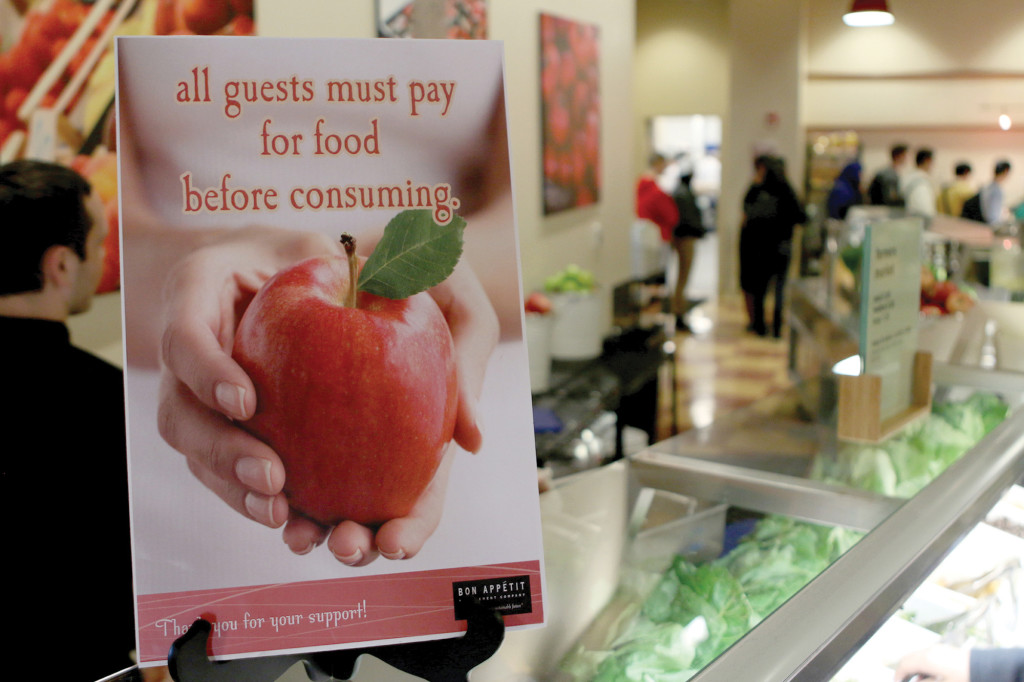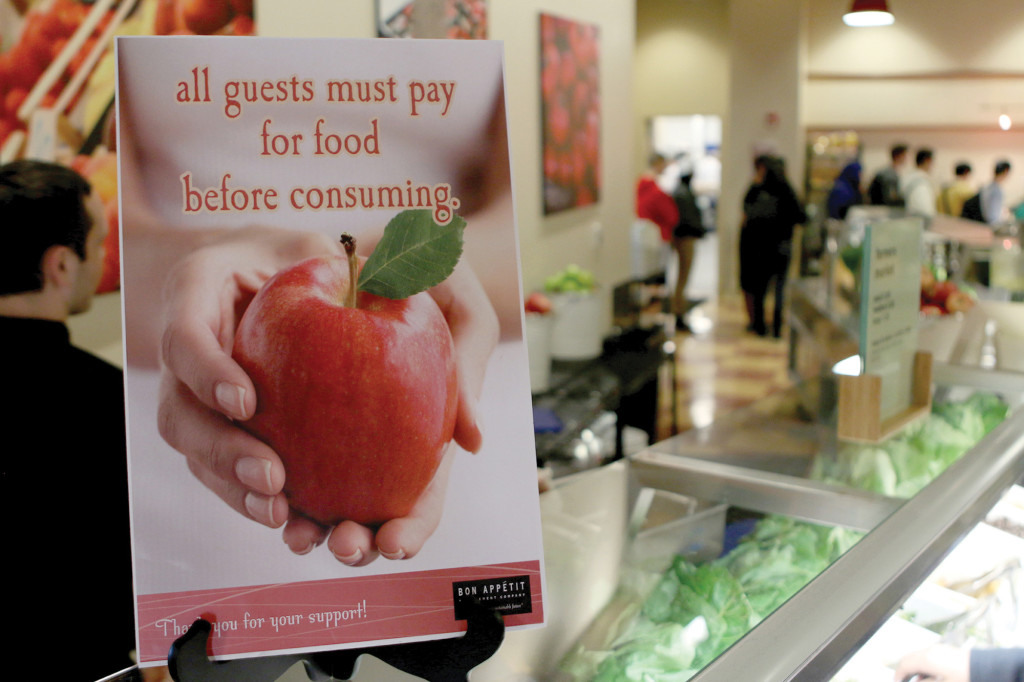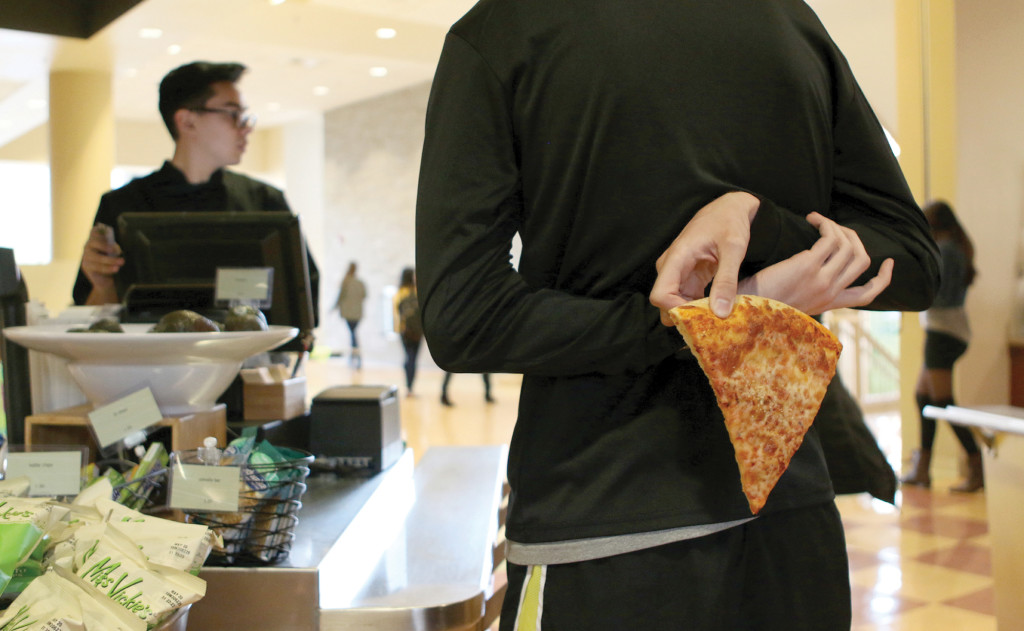Theft and pilferage is on the rise at Seattle University’s Cherry Street Market—and Bon Appétit is cracking down on students trying to take advantage of the food service.
Seattle U students may have noticed an email sent by Bon Appétit management regarding the recent increase in theft at Cherry Street Market (C-Street), the main cafeteria at Seattle U. According to the email, Bon Appétit has lost close to $100,000 in revenue due to “product theft and pilferage.”
“I think it’s a combination of lots of things,” said Buzz Hofford, Bon Appétit district manager at Seattle U, when asked about the source of the revenue loss. “Since I sent the letter out I’ve instructed our staff to be much more aggressive about catching people and turning them in. So far, we’ve had people who walked out, other people who have buried their chicken underneath a salad; we’ve had other people who have stuffed things in backpacks. And people who are just scarfing stuff down in the cafe.”

New signs in C-Street reminding students that food must be paid for before it is eaten. Bon Appetit sent students an email this past week describing $100,000 in stolen merchandise from the past year. photo by Taylor de Laveaga
Hofford hopes that the email, along with increased awareness and vigilance, will help deter students from stealing.
The penalties for students who are caught stealing vary case by case. Bon Appétit doesn’t manage these cases internally, instead referring students to the Seattle U Integrity
Formation Council.
Although Hofford hasn’t heard from any students in response to the email, he said that feedback from students in the past has usually been about the high price of Bon Appétit’s meals. Some students are unhappy with the prices and complain that the meal plans do not provide enough money to pay for sufficient meals.
Students have mixed feelings about the prices at C-Street.
“The prices are pretty high,” said Lucas Fink, Seattle U student. “Some things are reasonably priced. But I think other prices, like the large salad, are ridiculous.”
“I think they’re reasonable,” said Jacqueline Jacques, another Seattle U student. “I don’t pay too much attention to them or to my meal plan until the last week [of the quarter].”

After spring break, students returned to see these signs around Cherry Street Market asking diners to refrain from grazing and stealing food without purchasing. Bon Appétit reported over $100,000 of theft since the beginning of the year.
Hofford, who has discussed this issue with the Student Government of Seattle U (SGSU), said that the meal prices do not justify stealing. Bon Appétit is committed to sustainable, high-quality products and it is due to this policy, along with their commitment to paying employees a living wage and providing employees with benefits, that the prices are what they are. Additionally, theft causes food prices to increase for all students.
SGSU understands that students are concerned about high prices and would like to increase awareness about why the prices are so high, so that students will think twice about the money that they are spending on food.
“One of the things that our representatives brought up is the need to have increased signage explaining why things are so expensive,” said Mallory Barnes-Ohlson, executive vice president of SGSU. “That was one of the speculations as to why theft has increased, because students don’t feel like their meal plans are covering how much a meal costs. “Essentially, this means signage explaining the sustainable practices of Bon Appétit so students can understand that they’re getting their money’s worth.
Hofford reported that Bon Appétit is still working on how to incorporate that message into marketing and signage. Many students on campus guessed that Bon Appétit’s prices are high due to high quality products, but when asked, could not explain exactly what makes Bon Appetit’s service unique.
The issue of stealing from university cafeterias isn’t limited to Seattle U. Hofford mentioned that other universities that use Bon Appétit services, including the University of Portland, have experienced similar problems. He believes that it might be due to the open cafeteria style. Although closing off exits contradicts Bon Appétit’s commitment to hospitality, it could be necessary to prevent further revenue loss.
Hofford encourages any students who are concerned about Bon Appétit prices or policies to talk to him.
“I’m always available to talk to people if they feel for some reason that we did something wrong or we should do something different,” Hofford said. “We’re a customer service company—we’re all about taking care of our customers. Our students are our most important customers and so in a way there’s a sort of sense of betrayal that we’re taking care of people and trying to do the right thing for them and we feel like we’ve been taken advantage of…Whether it’s a slice of banana bread or a bottle of juice, when you have thousands of students stealing each day it really does add up.”








